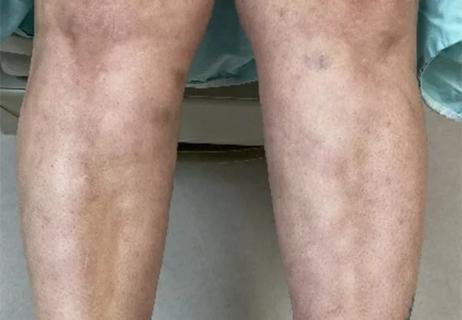Ambulation disability carries greatest risk, most disease-modifying therapies aren’t implicated

Among people with multiple sclerosis (MS) infected with SARS-CoV-2, ambulation disability, older age and Black race are among factors most associated with a worse clinical course of COVID-19, according to a large North American cohort study published in JAMA Neurology. The registry-based investigation also found that people with MS fare about the same as other populations following infection with the virus and that most MS therapies appear to have no effect on the severity of COVID-19.
Advertisement
Cleveland Clinic is a non-profit academic medical center. Advertising on our site helps support our mission. We do not endorse non-Cleveland Clinic products or services. Policy
“Neurologists have worried about how patients with autoimmune disorders like MS would do with COVID-19 infection,” says study co-author Robert Fox, MD, of Cleveland Clinic’s Mellen Center for Multiple Sclerosis Treatment and Research. “Now it appears that patients with MS generally do pretty much the same as other people with COVID-19, which is encouraging.”
He and researchers from several other U.S. and Canadian medical centers analyzed cross-sectional data on patients with MS and SARS-CoV-2 infection reported by healthcare professionals in the COVID-19 Infections in MS (COViMS) Registry from April 1 to Dec. 12, 2020.
The COViMS Registry, which includes community and academic practices throughout North America, was established early in the pandemic to understand how individuals with MS fare after virus infection and to assess the effect of various factors on COVID-19 outcomes in patients with MS.
Those eligible for inclusion in the registry are patients with MS and either laboratory-confirmed or highly suspected SARS-CoV-2 infection. Healthcare providers were asked to enroll patients in the registry after at least seven days from COVID-19 symptom onset and after enough time had transpired to describe the COVID-19 course through the end of acute illness or death.
Patients were categorized as having one of four outcomes, in increasing levels of severity:
A total of 1,626 patients were enrolled through Dec. 12 (data collection for the registry remains ongoing). Most (83%) had lab-confirmed SARS-CoV-2 infection, with the remainder having highly suspected infection. Other key attributes of the cohort were as follows:
Advertisement
Overall mortality across the cohort was 3.3%, which the authors note is in line with rates from other registry reports of MS patients with COVID-19 and other populations with COVID-19.
After adjusting for other risk factors, one factor — ambulatory disability — was found to be significantly associated with increased risk of all three of the more-severe clinical outcomes (hospitalization, ICU/ventilator or death) relative to no requirement for hospitalization. Among patients with ambulatory disability, the risk was greatest for those who were fully nonambulatory. Beyond this, several factors were significantly associated with elevated risk of at least one of the worse outcomes (hospitalization, ICU/ventilator or death), namely:
Analysis of outcomes by disease-modifying therapy (DMT) for MS found that patients taking rituximab were more likely to be hospitalized than patients not taking any DMT. A nonsignificant trend toward increased risk of hospitalization was also seen with ocrelizumab. Otherwise no DMTs were significantly associated with worse clinical outcomes.
The authors note that because COViMS Registry reporting is voluntary by healthcare professionals, reporting may be biased toward more severe cases, which would lead to overestimation of clinical severity in the registry. They add that this limitation would have less impact on comparisons among risk factors.
Dr. Fox says the study provides some reassurance to patients with MS and their providers. “Although MS therapies generally reduce the immune system, most MS therapies appear to have no effect on the severity of COVID-19 infection,” he notes. “This should give patients confidence to continue their MS therapies during the COVID-19 pandemic.”
Advertisement
At the same, he says, the finding that rituximab and ocrelizumab appear to increase the severity of COVID-19 makes it “important for patients receiving these therapies to take extra precautions in avoiding COVID-19 infection.”
Dr. Fox adds that the study has helpful implications for managing MS patients at the individual level. “Increased disability, Black race, advanced age and recent treatment with corticosteroids were each identified as risk factors for worse outcome with COVID-19,” he says. “This is important to consider when counseling patients and when monitoring COVID-19 in patients with these characteristics.”
Advertisement
Advertisement

Patients report improved sense of smell and taste

Clinicians who are accustomed to uncertainty can do well by patients

Unique skin changes can occur after infection or vaccine

Cleveland Clinic analysis suggests that obtaining care for the virus might reveal a previously undiagnosed condition

As the pandemic evolves, rheumatologists must continue to be mindful of most vulnerable patients

Early results suggest positive outcomes from COVID-19 PrEP treatment

Could the virus have caused the condition or triggered previously undiagnosed disease?

Five categories of cutaneous abnormalities are associated with COVID-19